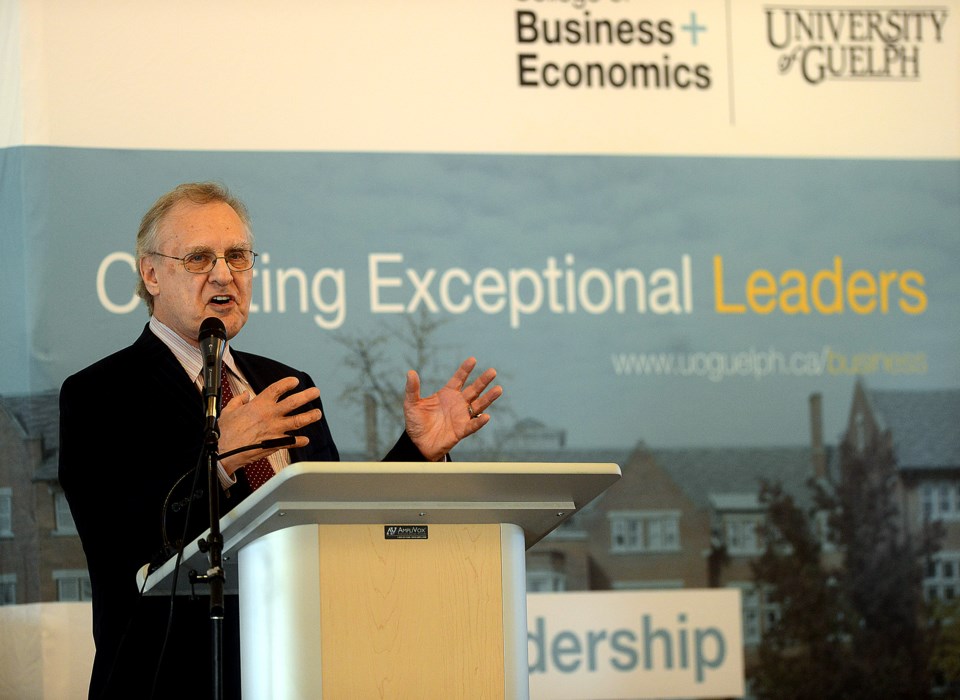When Stephen Lewis speaks in Orillia next week, his topic will be “AIDS in Africa and Beyond.”
Those familiar with the former politician and diplomat’s career and activism know HIV/AIDS in Africa has been Lewis’s main focus for a number of years. The “beyond” is what will be intriguing to those in attendance.
“The ‘beyond’ is around the central pandemic of HIV,” Lewis told OrilliaMatters. “I want to convey to the audience the pattern that is emerging.”
It’s not a pretty pattern.
As the number of people with HIV increases, global funding is going in the opposite direction.
“Partly because of (U.S. President Donald) Trump, the flatlining of resources and the decreased resources are putting a lot of community-based programs on the ground in peril,” Lewis said.
Trump, he noted, had called for a $1-billion cut in funding for the fight against HIV/AIDS in 2018. Congress didn’t approve it, but funding has also not increased. Now Trump wants $1.3 billion in cuts for 2019, Lewis added.
“It’s possible that cutbacks will occur, and everyone is frightened about that,” he said. “The international funding … is no longer there in the amounts that are necessary.”
Canada can’t claim to be the saviour, either. The country is doing “not particularly well” considering its “so-called feminist global policy,” according to Lewis.
Canada’s foreign aid budget makes up .26 to .29 per cent of its GDP. The global average is .33 to .35 per cent.
Global funding is inadequate, he said, when one looks at the statistics: 37 million people living with HIV/AIDS worldwide; 17 million still in need of treatment; two million infected every year; one million dying every year.
It’s a major crisis, Lewis said, and he would know.
Lewis, who was elected as an MPP in the 1960s and served as Ontario NDP leader in the ’70s, was the United Nations’ special envoy for HIV/AIDS in Africa — the first to hold that post. From 2001 to 2006, he helped shine a light on the pandemic.
“My appointment was really a public relations job. The UN was worried that the people understood the UN wasn’t responding enough,” he said. “I understood very quickly that the job could be used to make an impact. I took it very seriously. The UN didn’t, at least not in the first year.”
His work garnered a lot of attention, and it all happened “because of Kofi Annan,” Lewis said of the then-secretary-general of the UN.
“I was criticized often for speaking strongly on the issue, because it wasn’t diplomatic. In every situation, Kofi Annan had my back.”
Annan, a diplomat from Ghana, knew Lewis’s work was important, which “made a lot of difference,” Lewis said, when he met with heads of state. They took Lewis seriously.
He was succeeded in his post by Elizabeth Mataka, who served for a few years but “didn’t really do very much.” The contract with Mataka’s successor was cancelled after she was found to be in a conflict of interest. Then, it appears, the UN lost interest. It did away with the position altogether — a shame, said Lewis, who saw first-hand the gravity of the situation.
“In the 2000s, Africa felt like a graveyard when you travelled through it. People were going to funerals around the clock,” he said. “This remains a tremendous problem that has fallen off the radar.”
Lewis is doing his best to keep it on the radar. He founded the Stephen Lewis Foundation in 2003. The non-profit organization has funded and worked with more than 300 community-based groups in African countries that are most affected by HIV/AIDS.
Lewis and Paula Donovan then founded AIDS-Free World in 2007. As noted on the organization’s website, “It all started with HIV.”
“AIDS-Free World grew out of our intense frustration with the fact that HIV — a weak little virus — was able to take hold and decimate countries and communities. It preyed on the very people who were already living at the margins of their societies: women (and girls), men who have sex with men, injecting drug users, transgender people, persons with disabilities, and on and on.”
The group fights against “discriminatory laws and policies.”
During his presentation April 25 at St. Andrew’s Presbyterian Church in Orillia, Lewis will also speak about other topics — “two or three catastrophic issues,” he said. One of them is tuberculosis.
He recently travelled to India, South Africa and Nunavut, all of which have high rates of tuberculosis.
“It’s heartbreaking to see people dying in such large numbers when tuberculosis is curable,” he said.
So, while he is known for his work on the HIV/AIDS front, it’s not his only area of focus.
“I’m a democratic socialist,” he said. “When you’re a socialist, you get involved in every social struggle.”
His goal is to inspire his Orillia audience to take action.
“I hope I help to raise awareness about a complex of issues that are inevitably related, and energize them to join or support groups or causes that help address issues,” he said. “Although things are dire, the hope springs from getting involved yourself and recognizing that there’s hope in this world. The hope springs from the people on the ground.”
His talk at St. Andrew’s will start at 7 p.m., with doors opening at 6:30. Tickets cost $15, with proceeds going to the Lighthouse Soup Kitchen and Shelter’s Building Hope campaign. Tickets are available at St. Andrew’s and at Manticore Books. They will also be available for purchase at the door. Find out more here.
